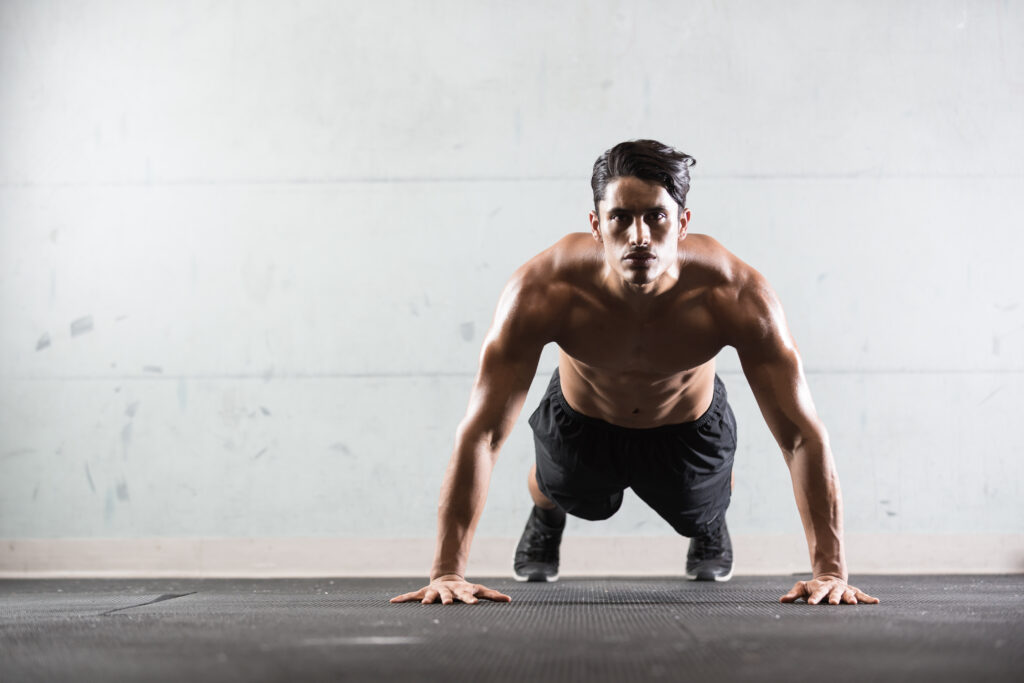So what can we learn about their diet, fitness and sleep habits that can help modern man today? A lot! Here’s three of our favourite caveman habits we can apply to modern male lifestyles …
1. The Keto diet
OK the cavemen didn’t call it the ‘keto diet’, they probably called it the grrrrrrrunt diet, but it was essentially the same thing. In simple terms, the keto diet is a high fat low carb (LCHF) diet that results in ketosis (ketosis is a state where the body “uses fat as a key energy source as opposed to carbs).”
Caveman keto food include high fat products such as red meat, bacon, chicken, turkey, fatty fish like salmon, eggs, oils (think olive oil, coconut oil, avocado oil), unprocessed cheeses and low carb veggies (most green veg as well as year-round faves tomatoes, onions, peppers). You know, your typical caveman supermarket supplies.
For cavemen, the benefits of having less body fat can make (or break) your survival. For example, carrying less fat gives you a clear advantage to hunt down four-legged foods over your unfit caveman flatmate who’s carrying an extra 20 k-g. And when it comes to attracting a cavewoman (and securing a spot in the 2020 gene pool), we’d bet our last box of matches the ‘fitter, healthier and leaner’ cave dudes won out spears down.
Fast forward to today, and losing excess fat and achieving a state of ketosis has just as many perks. Namely, better health, wellbeing and longevity. According to the Australian Institute of Health and Welfare, “excess weight, especially obesity, is a major risk factor for cardiovascular disease, type 2 diabetes, some musculoskeletal conditions and some cancers. As the level of excess weight increases, so does the risk of developing these conditions. In addition, being overweight can hamper the ability to control or manage chronic conditions.”
To find out more about the Keto diet, what foods you can and can’t eat and find your free keto diet plan, visit FatBlaster Keto-Fit.
2. Bodyweight workouts
Cavemen obviously didn’t have a local gym, but they definitely did a lot of heavy lifting. Aside from the requisite kangaroo or cow thrown over one’s shoulders, or the occasional cavewomen, our cavemen ancestors essentially relied on their own bodyweight for conditioning, building strength, muscle, flexibility, balance, coordination and of course power and speed.
In a nutshell, bodyweight training is strength training that uses our own weight to provide resistance against gravity. It helps develop core stability, joint stabilisation and promotes closed-chain exercises, strengthening several muscle groups at once. The best bit? It’s free! No cash-ola required! And you can do it anywhere and at any time.
For the modern man, think push-ups, squats, star jumps, lunges … or a typical calisthenics session! Bodyweight training dates back thousands of years and is recorded throughout history as a training method by the ancient Greeks, Egyptians and Romans (think ‘Spartans’ a la discus, javelin, wrestling, boxing, and other combat sports).
3. Sleep
Now, this may surprise you, but cavemen didn’t have Netflix to binge watch until 1am on work nights. Actually, cavemen didn’t even have electricity. Their sleep and wake cycle was a whole lot simpler with sleep occurring when the sun went down and activities such as hunting, gathering and socialising commencing when the sun came up! Who’d have thought, hey?
And the good news, sleeping at night and being awake and active during the daylight hours worked – they successfully evolved and got us where we are today!
Now, the bad news. According to Flinders University’s Adelaide Institute for Sleep Health, sleep issues today are far and wide, and the two most common disorders – obstructive sleep apnoea (OSA) and insomnia – actually cost the Australian economy well over $30 billion per year.
Poor quality sleep and sleep disorders negatively suck. They impact our physical and emotional health, including our mood, relationships, outlook, energy levels, concentration, performance, efficiency, productivity, safety and overall health.
So what can you do about it – besides going to bed when the sunsets and rising when the sun rises? Lots!
Research shows that the average adult needs 7-9 hours of sleep in a 24 hour period. Find your optimum number and make sure you get it. Take note of your ‘circadian rhythm’ – or body clock. It has two natural peaks in alertness – one at around 9am and the other at 9pm. Use the morning peak for exercise, work meetings or anything else that’s important for you to be switched on and present. Exercise boosts endorphins and energy, so a few 9am jumping jacks could be just what you need to kick start a kick ass creative and high performing day.
Now what goes up must come down… welcome to natural dip in alertness, which occurs around 2-3pm (the arvo’ slump – perfect for a quick 45-60 minute sleep cycle nap) and from about 11pm to 6am. Recognise your natural body clock dips and alertness and plan your day accordingly.
And while we’re on planning, remember the 3 hour rule – avoid eating and exercising within three hours of sleep time. Exercise kicks your body into gear and eating kick-starts your digestive system in order to break down the food. Instead, turn the lights down low and switch off electronic devices. According to the National Sleep Foundation, even small electronic devices emit sufficient light to miscue the brain and promote wakefulness. Instead, allow your mind and body to enter the rest and recovery phase and wind down.












